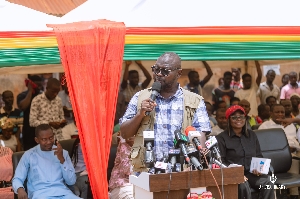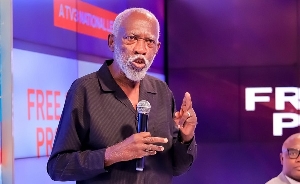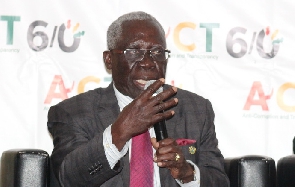By Kofi Ata, Cambridge, UK
Just a month ago, I posted an article on the ongoing cocaine turned sodium bicarbonate (washing soda) episode in Ghana (see Ghanaweb of December 17, 2011, “Is this NDC’s Cocaine Saga and who is to blame, the Police or the Judiciary?”). In that article, though I cautioned those who had given the police all clear that it was too early, I unfortunately gave the benefit of the doubt to the police and pointed an accusing figure at the Judiciary. I have read the summaries of both Justice Dordzie Committee of Inquiry report and the BNI interim report and I am persuaded that the Judiciary had nothing to do with the swapping of the cocaine exhibit with washing soda. I want to discuss matters arising out the two reports, especially, minor but important issues emanating from them.
Before I continue, I should be humble enough to offer my apology to the Judiciary for suggesting that the court officials had a hand in the swapping of the cocaine. I was wrong, your hands are clean.
The Justice Dordzie Committee concluded that, the cocaine was swapped with washing soda before it was brought to the court and therefore the police was responsible for that act. This conclusion was based on the fact that, all the witnesses from both the Police and the Court, including the Judge as well as the State Attorney and the Defence Attorney confirmed that, cocaine in whatever form has a very peculiar “pungent smell” but the cocaine exhibit the police presented to the court did not have that pungent smell. To me the Committee’s conclusion is credible, reasonable and valid. It is not scientific but based on logical reasoning.
The Committee’s report contained a very serious allegation against the police and I quote. “He (that is, Mr Kwablah Senanu, the Defence Attorney) informed the Committee that after he had raised the objection to the authenticity of the substance and went downstairs, the police, including Thomas Anyekese (the First Investigator), came around and told him that the objection he had raised was going to create a “Tsunami and tremor” at the police headquarters; and from that day, as a practitioner, he has “feelers” and he knows that since then had reason to believe that there was indeed an “earth tremor” because of the results of the objection he raised”.
I must admit that I have not read the full report but there is no indication in the summary report (posted on Ghanaweb) that, the Committee questioned any police officer or Thomas Anyekese, about the above claim by Mr Kwabla Senanu. I find the lack of verification of this serious allegation very unfortunate on the part of the Committee. That is the only minor but important matter arising out of the Justice Dordzie Committee of Inquiry. I will return to this subject later.
The BNI interim report also concluded that the police was responsible for the swapping of the cocaine with washing soda. The summary that was posted on Ghanaweb was very scanty. In fact, the BNI did not provide any evidence or basis of their conclusions. The report also stated among others the following:
1. There was evidence that agents of the accused (Nana Ama Martin) tried unsuccessfully to influence the court officials with an amount of fifty thousand Ghana cedis (GH¢50,000.00);
2. She (DSP Gifty Mawuenyega Tehoda, Deputy Commander of Commercial Crime Unit at the Criminal Investigations Department Headquarters) held nine meetings with the accused without the permission of the investigators and tried to deceive her subordinates in charge of the custody of the accused by indicating in the station diary that she needed her (the accused) for further investigation when she had nothing to do with the matter;
3. Some of the nine meetings she had with the accused in her office were attended by a friend and agent of the accused who confessed having run errands for the accused including making the attempts to bribe the judge and his officials, and an uncle of the accused who, with the agent earlier referred to, was instrumental in selling off property of the accused in Gbawe, in an effort to raise money to pay legal fees and bribe officials connected with the case.
4. Mr Kwablah Senanu (the Defence Attorney) on three occasions took his legal fees from DSP Mawuenyega Tehoda in her office.
A number of matters arise from the above, which surprisingly were not addressed by the interim recommendations made by BNI. It is clear from the above that DSP Mawuenyega Tehoda actively pursued the unlawful acquittal and release of Nana Ama Martin, the accused. In fact, she acted as the agent or agent provocateur, if not the principal agent.
One of the most shocking revelations in the BNI report is four above, that on three occasions the Defence Attorney, Mr Kwablah Senanu received his fees from DSP Mawuenyega Tehoda in her office. From that, it is obvious that Mr Kwablah Senanu was either part of the scheme or was aware of the scheme to swap the cocaine. That was why despite being aware that the cocaine did not have the pungent smell when it was first opened at the court on September 27 he did not ask for a retesting that day but the following day, September 28. It was a calculated ploy by him not to expose the involvement of police in the swapping and to create the impression that the court officials swapped the cocaine.
I am shocked that the BNI report did not recommend that the role, if any, played by Mr Kwablah Senanu be investigated for further action against him, including potential prosecution if he is found to be involved in the cocaine swapping scheme. In fact, the Ghana Bar Association could investigate Mr Senanu for unprofessional conduct and conflict of interest by collecting his fees from and in the office of DSP Mawuenyega, who was part of the prosecuting authority. It even appears to me that DSP Mawuenyega might have secured the services of Mr Senanu as Defence Attorney for Nana Ama Martin.
The unprofessional behaviour of Mr Kwablah Senanu should put in context the allegations he made against the police to the Justice Dordzie Committee of Inquiry. The claim that some police officers, including Thomas Anyekese told him that, “his request for retesting of the exhibit would create a Tsunami and tremor at the police headquarters”, is now very questionable, doubtful and unreliable. That is why I was disappointed that the Committee did not recall any police officer or Thomas Anyekese to verify this allegation.
Again, the BNI recommendation is silent on the agent/s and family members of the accused who allegedly attempted to bribe court officials. I expected BNI to have recommended that their role/s should be investigated for further action, including possible prosecution for attempting to bribe public officials and perverting the course of justice.
Ghana Police has issued a statement rejecting the findings of both The Justice Dordzie Committee and BNI. The Director-General of the Ghana Police Criminal Investigations Department, Deputy Commissioner of Police (DCOP,) Prosper Agblor claimed that the conclusion of the Committee is unscientific, so the police would not accept it. I wonder what scientific evidence was DCOP Agblor expecting the Committee to provide to buttress their conclusion. DCOP Agblor, for your information, the Committee relied on logic and common sense that was rational and valid because the normal pungent smell of cocaine was absent when the exhibit was opened at the court on 27 September. That would not require “rocket science to prove but analytical evaluation of what transpired. I am afraid you may lack that analytical skill or you are just refusing to accept the conclusions of the Committee and BNI.
Is it not laughable that the Police has now offered cash reward for information from the public to assist them unearth the mystery surrounding the swapping of the cocaine with washing soda? The crime was perpetrated by a few people either within the police or from outside in cohort with the top echelon of the police, yet, they are asking the public to provide information to them to unpick it. What an insult to the intelligence of Ghanaians? The evidence is already with the police but they have no clue how to get it.
Let me assist them and for my assistance they should donate my cash reward to Komfo Anokye Hospital to repair the broken down life supporting machines. The police should use the basis of the two reports to secure a court order to get the finger prints of all those who have been mentioned in the BNI report, especially, DSP Mawuenyega Tehoda and Mr Senanu to test them against figure prints on the washing soda exhibit. If the figure prints of those who were not authorised to handle the exhibit prove positive, then they should explain how their finger prints came to be on the washing soda exhibit. That may not prove conclusive (since it is likely that the swap was done by one of the police officers who had official access to the exhibit) but will reduce the number of suspects which the police can then turn attention to. The police should not be allowed to use public funds for an exercise in futility because the cash reward would not yield any positive result and a waste of public funds.
The unbroken seal of the exhibit being used by the police to dispute the Committee and BNI conclusions is weak because the police are trained and are able to enter locked and secured places without any trace of entry. The police are therefore capable of replacing the cocaine exhibit with washing soda without disturbing or breaking the seal. The only evidence left would be finger prints of the culprit/s, unless they were clever enough to have used protective gloves. This case makes me wonder how may cocaine exhibits with the police have disappeared into thin air without anyone noticing but the accused have been successful prosecuted, convicted and jailed with washing soda exhibits. How long such criminal activity has been ongoing and only God knows what happened to the real cocaine exhibits (possibly sold by corrupt police officers to enrich themselves)?
In conclusion, I applaud all the court officials who refused to be bribed by the agent/s of the accused. However, if court officials were approached with money to bribe them in order to influence the case before a Judge, why did those officials not report such criminal behaviour to the authorities? Could they also be investigated for further action against them for failing to report potential crime? The Justice Dordzie Committee of Inquiry and the BNI reports have thrown some light on the Nana Ama Martin cocaine saga but also left some questions unanswered. I hope appropriate action/s would be taken against whoever contributed to the perversion of the course of justice that led to the wrongful acquittal of Nana Ama Martin. Nonetheless, whatever action is taken subsequently must follow due process. Sadly, BNI has already detained DSP Mawuenyega Tehoda beyond the 48 hours allowed under law without any attempt to seek authorisation from the courts to further detain her until she was granted bail by court. Again, BNI prevented the media from carrying out their legitimate duties of informing and educating the Ghanaian public on an issue of great national interest. BNI must learn to operate within the confines of the law and not above it, even if they are attacked in the course of performing their duties.
By Kofi Ata, Cambridge, UK












